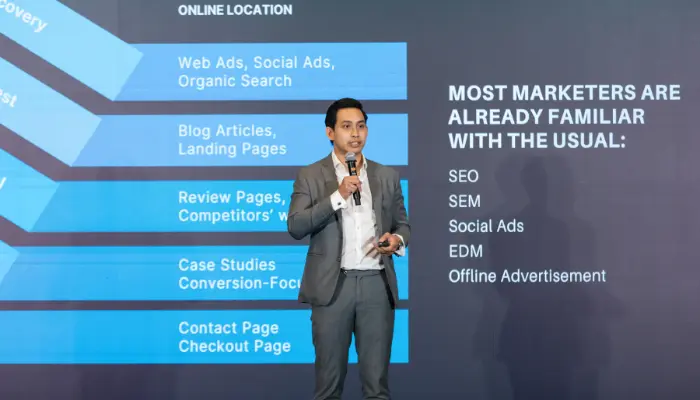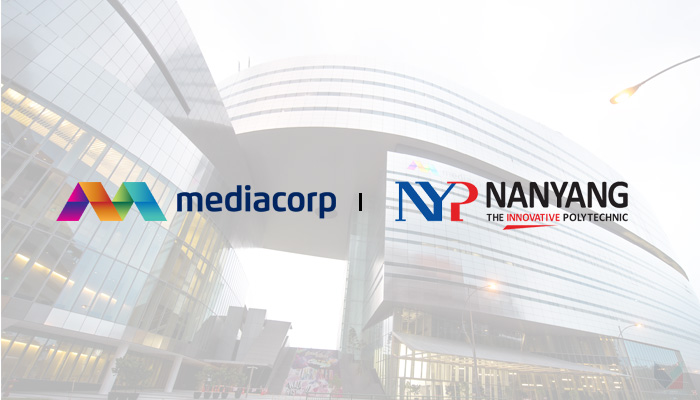As customers increasingly rely on in-person and various online channels when making purchases, marketers need to adopt an omnichannel approach to provide a seamless and integrated customer experience across all touchpoints.
An essential component of omnichannel marketing is the implementation of chat platforms as a lead generation tool. By facilitating one-to-one conversations between a brand and customers, businesses can customise interactions to align with customer preferences, introduce their latest products or services, and provide support in real-time.
Now more than ever, marketers have to navigate and resolve the challenges associated with integrating new messaging channels into their existing omnichannel strategies.
These topics were tackled at the keynote presentation of global SaaS brand SleekFlow during the What’s NEXT 2024: Marketing in Singapore conference held at Furama City Centre on March 7, 2024.
Sharing his insights as a presenter at the conference, Asnawi Jufrie, vice president and general manager for Southeast Asia (SEA) at SleekFlow, underlines the importance of customer-centricity within omni-enterprise models, as well as the role of automation in effectively managing multiple messaging channels while maintaining a consistent brand message.
Why chat is important in a conversion-driving marketing strategy
According to Jufrie, chat is an often overlooked but highly effective subsegment of the traditional marketing funnel. Research shows that 7 out of 10 people feel more connected to brands that are accessible via direct messaging, rather than relying solely on emails or phone calls. However, many CRM platforms primarily focus on tracking emails and phone calls, neglecting the potential of chat.
This is especially significant nowadays with messaging applications such as WhatsApp having over 2.5 billion monthly users, with a daily engagement rate of 70%. Among these users, 175 million of those users are communicating with businesses every day. Additionally, other messaging platforms such as Telegram and Line also attract millions of users.
When explaining chat’s significance in customer-centric marketing, he noted that conversations through chat align with how typically communicate and establish connections in their daily lives, making these channels inherently familiar and easy to use. The integration of AI further elevates the potential of chat in the marketing space, with marketers and brands exploring AI platforms like ChatGPT.
Jufrie further emphasised that brands that fail to leverage this market opportunity risk falling behind. Engaging in conversations allows for the development of stronger brands, improved customer engagement, and ultimately leads to higher conversions.
Accelerating lead generation through chat
Jufrie reiterated the need to prioritise improving lead generation through chat as an efficient means of communication when driving traffic to a brand’s website. To achieve this, brands can implement simple tools like a messaging platform widget or an embedded link. These tools allow consumers to quickly submit queries, concerns, or feedback. Offline media can also utilise chat-based lead generation strategies by incorporating QR codes that direct consumers to messaging platforms.
When leads are generated through chat, it’s crucial to qualify them. This can be easily achieved using automation features within messaging platforms, which lighten the workload for sales staff when dealing with a large number of leads.
Once leads are qualified, the focus shifts to nurturing and retargeting them. Traditional methods like email marketing (EDMs) and social media orchestration are commonly used, but Jufrie highlights WhatsApp as a more effective option due to its 98% open rate and personalised messaging.
To maximise efficiency, Jufrie suggests promptly responding to leads and adopting a chat-first strategy. This can be facilitated through website form submissions and Facebook instant forms, which direct leads to chat for a seamless process. The same approach can be applied to organic social media engagements, automating responses to comments and initiating direct chats.
In addition to these processes, collaboration and smart routing are essential. Organising and assigning conversations to support or sales staff based on queues or specific conditions optimises team collaboration and ensures prompt responses to lead needs.
Considering data management is crucial for effective chat processes. Data ownership and visibility are key factors since chat conversations may contain valuable information such as mentorship processes and collaborative strategies. Locally storing data is also vital for security, especially when it involves customer data.
Lastly, Jufrie addressed the importance of driving customer loyalty through a chat-first strategy. Instead of relying on email surveys, brands can use messaging to gather feedback, providing a streamlined and personalised approach that values the customer’s voice. Moreover, a chat-focused approach increases the visibility of promotions and event invitations.
How SleekFlow empowers brands with an automated platform for chat marketing
For these channels, it’s very important to organise a chat-first strategy. By leveraging SleekFlow, marketers and brands have a wide range of features at their fingertips to efficiently streamline customer interactions and push this strategy forward towards their consumers.
“At SleekFlow, we advocate for a chat-first strategy and develop brands into an omni-enterprise by orchestrating everything into our platform. Our solution is rather agnostic, meaning that it’s versatile and can integrate with different messaging and chat platforms, making it a suitable solution for industries like education, beauty & wellness, finance, and more. If you use varying messaging or chat platforms to communicate with your customers, we are a good solution fit,” Jufrie mentioned.
To help put this strategy into fruition, SleekFlow offers brands and marketers an AI-powered Omnichannel Conversation Suite that enables a seamless and personalised customer experience across popular social and messaging platforms such as WhatsApp, Facebook, Instagram, SMS, live chat, and more.
Jufrie’s presentation is part of a series of presentations and discussions under the What’s NEXT 2024: Marketing in Singapore hybrid conference, where SleekFlow was a proud Gold sponsor. In it, SleekFlow led the discussion on the challenges and solutions in integrating new messaging channels, as well as how applying customer centricity with this method leads to enhanced customer experiences.
With SleekFlow’s customer engagement platform, enterprises can conveniently manage all customer interactions in one centralised hub, automating their business growth from sales and marketing to customer support. The most recent launch of SleekFlow 2.0, which includes the launch of SleekFlow AI, aims to empower companies to centre all their workflows around meaningful conversations.
What’s NEXT 2024: Marketing in Singapore is part of the trilogy of conferences from MARKETECH APAC’s “What’s NEXT 2023-2024 Series.” The conference featured a diverse lineup of marketing leaders across Singapore, representing local and international brands including DirectAsia, Grab, HP, Johnson & Johnson, Kaspersky, Singapore Management University, Singapore Post, Standard Chartered Bank, StarHub, The LEGO Group, and more.


